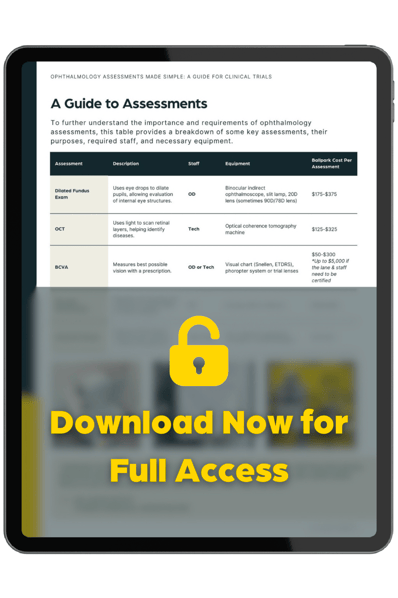Ophthalmology assessments are pivotal in clinical trials, safeguarding participant health and ensuring accurate study outcomes. These evaluations identify potential side effects and verify treatment efficacy, making them indispensable across various therapeutic areas, from general medicine and rare diseases to oncology and neurology.
20/20 Onsite’s VP of Life Sciences Jessica McKenzie Mays agrees: "You can tell a lot about what's happening in a body through the eyes. You can diagnose a whole host of issues through a simple, noninvasive eye exam."
Conquering Challenges in Ophthalmology Assessments
Integrating ophthalmology assessments into clinical trials presents several challenges. Clinical sites often face hurdles related to the following:
- Resource Demands: It can be cost-prohibitive for sites to acquire advanced diagnostic tools and trained personnel.
- Patient Accessibility: Geographical barriers can hinder patient participation, impacting trial retention and compliance.
- Financial Constraints: High costs associated with ophthalmology assessments can strain trial budgets.
- Regulatory Compliance: Ensuring adherence to FDA and other regulatory standards adds complexity to trial management.
"We are creating a lot of ophthalmology health deserts across the U.S.," Mays noted, emphasizing the need to address accessibility and resource distribution. Overcoming these challenges requires effective strategies to streamline ophthalmology assessments and mitigate potential issues.
Implement Strategic Solutions for Clinical Trial Success
To overcome the barriers associated with ophthalmology assessments, implement robust solutions such as:
- Leverage Advanced Diagnostic Technologies: Utilize state-of-the-art equipment to enhance the accuracy and efficiency of assessments.
- Enhance Patient Accessibility: Bring eye care services directly to patients through innovative approaches such as Mobile Vision Clinics, improving accessibility and retention rates. "20/20 Onsite is a mobile ophthalmology vendor bringing equipment or people to places they otherwise wouldn't be," said Mays.
- Efficiently Manage Financial and Logistical Aspects: Employ cost-effective solutions like shared equipment programs and outsourcing to specialized service providers. Streamline logistical operations with integrated scheduling systems to improve coordination and reduce administrative workload.
- Ensure Rigorous Compliance with Regulatory Standards: Adopt standardized protocols and invest in training programs for staff to meet regulatory requirements. Utilize electronic health records (EHR) and other digital tools to facilitate accurate and efficient documentation.
Addressing these areas can significantly improve the integration and execution of evaluations in clinical trials.
Simplify Integrating Ophthalmology Assessments into Your Protocol
20/20 Onsite’s newly released guide, "Ophthalmology Assessments Made Simple: A Guide for Clinical Trials," is a valuable resource that provides insights into overcoming these challenges. This quick-start guide is designed to assist research sites, whether small or large, in navigating complexities and driving their clinical trials to success. It offers a breakdown of common ophthalmology assessments, insights into the overlooked hurdles of integration, and more.
Complete the Form to Get Your Quick-Start Guide Now
Discover how leveraging advanced diagnostic technologies and strategic solutions can impact the cost and efficiency of common ocular assessments. This preview from our guide offers a glimpse into the financial and logistical considerations behind essential eye evaluations for optimizing clinical trial success.



